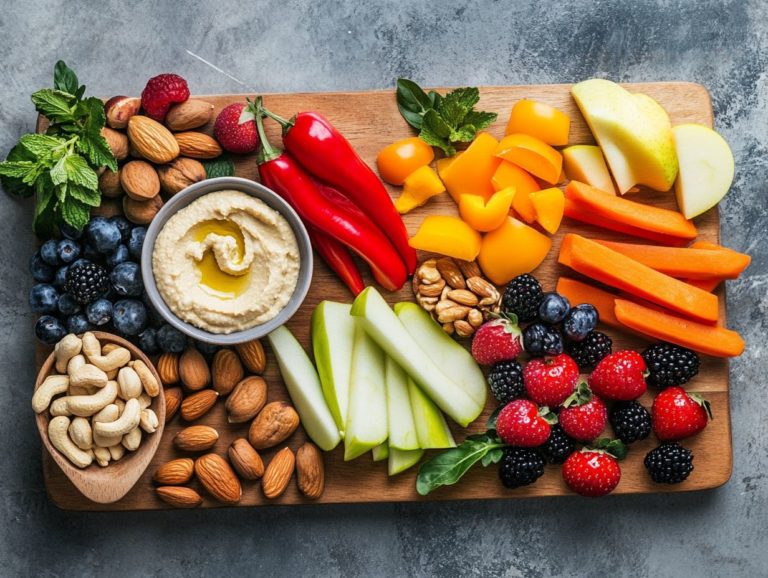5 Steps to Transition to Holistic Nutrition
In a world that s progressively prioritizing health, holistic nutrition stands out as a transformative approach that transcends the limitations of calorie counting and restrictive diets.
This guide will walk you through five essential steps to embrace a holistic nutrition lifestyle. It starts with a deep understanding of its core principles and culminates in the seamless incorporation of whole, unprocessed foods into your meals.
You ll also uncover common misconceptions, gain insights on navigating social settings, and learn how holistic nutrition can effectively address specific health concerns.
Explore how these sustainable changes can profoundly enhance your well-being, nourishing not just your body, but also your mind and spirit.
Contents
- Key Takeaways:
- 1. Understand the Basics of Holistic Nutrition
- 2. Evaluate Your Current Diet and Habits
- 3. Incorporate Whole, Unprocessed Foods
- 4. Make Small, Sustainable Changes
- 5. Seek Guidance from a Holistic Nutritionist
- What Is Holistic Nutrition and How Does It Differ from Traditional Nutrition?
- Why Is Holistic Nutrition Important for Overall Health and Well-Being?
- What Are Some Common Misconceptions About Holistic Nutrition?
- How Can One Transition to a Holistic Nutrition Lifestyle on a Budget?
- What Are Some Tips for Maintaining a Holistic Nutrition Diet in Social Settings?
- How Can Holistic Nutrition Help with Specific Health Concerns?
- Frequently Asked Questions
- Why Transition to Holistic Nutrition?
- 5 Steps to Transition to Holistic Nutrition
- How Long Does It Take to Transition?
- Do I Have to Give Up My Favorite Foods?
- Can I Eat Out While Following This Diet?
Key Takeaways:

Discover how holistic nutrition can transform your health! Gain a basic understanding of holistic nutrition to make informed choices about your health.
Take a critical look at your current diet and habits to identify areas for improvement.
Incorporate whole, unprocessed foods into your diet for optimal nutrition and health benefits.
1. Understand the Basics of Holistic Nutrition
Think of holistic nutrition as your key to a healthier life. It highlights the vital connection between physical health, emotional well-being, and overall vitality.
It s not just about what you eat; it s about understanding your unique needs and lifestyle choices. This idea recognizes that nutrition influences not only your body but also your mind.
By doing this, you can craft a comprehensive health plan that nurtures both your nutritional requirements and life s balance.
Unlike traditional nutrition, which often focuses on caloric intake and macronutrient ratios, holistic nutrition embraces the diverse dietary needs shaped by your unique circumstances your genetics, lifestyle, and personal health aspirations.
This approach sheds light on the negative impact of processed foods, which can lead to energy crashes and long-term health problems. On the flip side, embracing whole foods and healthy fats fuels your body while promoting mental clarity and emotional stability, paving the way for a more balanced life.
It encourages you to explore your relationship with food and emphasizes the importance of mindful eating, all aimed at enhancing your overall health.
2. Evaluate Your Current Diet and Habits
To transition seamlessly to a healthier lifestyle, you must first evaluate your current eating habits and dietary patterns. This step is crucial in identifying the areas that require change to align with your nutritional needs and health goals.
Engaging in this self-assessment gives you valuable insights into the specific foods you consume, the portion sizes you typically indulge in, and how often you treat yourself. Recognizing these eating tendencies lays a solid foundation for making informed adjustments.
For instance, keeping a food diary can be a powerful tool; it allows you to track portion control and visualize where you might be overindulging.
Reviewing labels for sugar and sodium content helps you make conscious choices while shopping, guiding you toward healthier alternatives. Ultimately, cultivating this holistic awareness will help you foster a more balanced diet that closely aligns with your aspirations for well-being.
3. Incorporate Whole, Unprocessed Foods
Incorporating whole, unprocessed foods into your diet is essential for maximizing the nutritional value of your meals, ultimately leading to improved health outcomes and boosted energy levels.
These foods, particularly a vibrant array of fruits and vegetables, are packed with essential vitamins, minerals, and fiber elements fundamental for maintaining bodily functions and promoting overall well-being.
Nutrition counseling, which involves working with a specialist to improve your eating habits, often emphasizes the importance of weaving these items into your daily meals, especially if you’re navigating dietary restrictions.
By understanding how to creatively incorporate antioxidants through colorful produce, you can elevate the flavor of your dishes while simultaneously enhancing your immunity and reducing inflammation.
Such strategies enable you to meet your specific dietary needs, ensuring that your plates overflow with health-promoting nutrients.
4. Make Small, Sustainable Changes

Small, sustainable changes to your eating habits can significantly improve your health. They can also help address symptoms and support your weight loss goals.
These incremental adjustments cultivate a healthier lifestyle. They create a positive ripple effect on your emotional well-being, often lifting your mood and alleviating stress.
By engaging with health coaches, you can receive personalized meal plans tailored to your unique needs and preferences. This approach allows for a more focused health journey.
This guidance helps you understand the nutritional value of foods and how they affect both your body and mind. It ultimately leads you toward a more balanced and fulfilling life.
Your journey of transformation becomes a complete experience, focused on better health and happiness.
5. Seek Guidance from a Holistic Nutritionist
Seeking guidance from a holistic nutritionist offers tailored nutrition counseling that directly addresses your unique needs. This ensures a personalized path to achieving your health goals.
These professionals possess a wealth of expertise in nutritional therapy. They provide strategies that accommodate various dietary restrictions while promoting overall well-being.
By understanding your individual health history and lifestyle choices, they craft customized meal plans and recommend optimal food alternatives. They expertly navigate the complexities of allergies and intolerances.
A holistic nutritionist also connects you to community support resources. This helps you build a network of like-minded individuals.
Join this vibrant community today! Boost your motivation and share your experiences with others on the same health journey.
What Is Holistic Nutrition and How Does It Differ from Traditional Nutrition?
Holistic nutrition offers a comprehensive approach to dietary health that embraces your entire being body, mind, and spirit. This sets it apart from traditional nutrition, which often focuses on caloric intake and macronutrient distribution.
It emphasizes understanding how various foods can influence your overall wellness while adhering to established dietary guidelines.
In this holistic view, you re encouraged to explore the emotional and psychological connections with food. Factors like stress, lifestyle choices, and personal beliefs shape your nutritional decisions significantly.
In contrast, traditional nutrition relies heavily on scientific research. It offers structured meal plans based solely on nutrients.
Health professionals embracing a holistic framework might use methods like Nutrition Response Testing. This technique evaluates your body s nutritional needs and imbalances, highlighting the intricate relationship between physical health and emotional well-being.
This shift toward personalized care is crucial for nurturing your optimal health.
Why Is Holistic Nutrition Important for Overall Health and Well-Being?
Embracing holistic nutrition can transform your health journey in exciting ways! It promotes a balanced approach to eating that supports your immune system, helps prevent chronic diseases, and addresses concerns like the obesity epidemic, all by integrating nutrient-dense foods and mindful lifestyle choices.
By emphasizing whole, unprocessed foods, this approach delivers essential vitamins and minerals. It also enhances your body s ability to absorb nutrients critical for optimal health.
Take vitamin D, for example; it plays a pivotal role in regulating calcium levels and boosting your mood. This can significantly lower the risk of chronic illnesses such as heart disease and diabetes.
Holistic nutrition encourages you to cultivate a deeper connection with your meals. This mindfulness enhances digestion and overall bodily function.
By adopting these principles, you can experience a more energized lifestyle, improved digestive health, and a resilient immune response.
What Are Some Common Misconceptions About Holistic Nutrition?

Don’t let misconceptions hold you back from a healthier lifestyle! Several common misconceptions about holistic nutrition can create unnecessary confusion, such as the belief that it excludes all processed foods or that it is impractical due to dietary restrictions. These misunderstandings may deter you from pursuing a healthier lifestyle.
In reality, holistic nutrition embraces a wide range of food sources while promoting a balanced approach that encourages mindful eating. Instead of imposing strict limitations, it invites you to explore nutritious options and discover joy in diverse meals.
This perspective allows for the occasional treat, recognizing that moderation in sugar consumption is essential. By addressing these outdated views, it becomes evident that holistic nutrition can be tailored to fit your individual preferences and lifestyle, making it accessible and enjoyable for everyone.
How Can One Transition to a Holistic Nutrition Lifestyle on a Budget?
Transitioning to a holistic nutrition lifestyle on a budget is not only attainable but also a rewarding journey when you prioritize smart food choices, plan with thoughtful meal strategies, and shop efficiently at the grocery store. Understanding the science behind holistic nutrition can further enhance your journey, proving that you can absolutely achieve it!
By making minor adjustments to your shopping habits, you can uncover a treasure trove of affordable whole foods that nourish both body and mind. Begin your exploration at local farmers’ markets, where you ll often find seasonal produce that s fresher and more economical.
Incorporating in-season fruits and vegetables enhances the flavors of your meals while supporting local agriculture and minimizing transportation costs.
Use simple meal planning techniques, like batch cooking and utilizing versatile ingredients, to whip up delicious, budget-friendly meals that align seamlessly with holistic principles.
This approach cultivates a mindful eating experience while ensuring financial sustainability, demonstrating that health and wellness are indeed within reach for everyone.
What Are Some Tips for Maintaining a Holistic Nutrition Diet in Social Settings?
Maintaining a holistic nutrition diet in social settings can indeed be a challenge, but with mindful eating habits and thoughtful food choices, it s entirely achievable. This approach nurtures your well-being and fosters a supportive community centered around healthy living.
Navigating these environments often calls for a bit of preparation and a positive mindset. Be transparent about your dietary preferences. By advocating for healthier options, you can encourage your hosts to include nutritious dishes, making it easier for everyone to enjoy a balanced meal together.
Practicing portion control can work wonders; savoring smaller servings allows you to relish the flavors without feeling deprived. Engaging in conversations about wellness inspires those around you and strengthens community bonds, creating an atmosphere where healthy choices are both celebrated and supported.
How Can Holistic Nutrition Help with Specific Health Concerns?
Holistic nutrition offers targeted support for specific health concerns, employing strategies like a method used to understand how foods affect your body and adherence to dietary guidelines to effectively manage conditions such as type 2 diabetes, osteoporosis, and heart disease.
By concentrating on your unique needs, nutritional specialists can craft personalized meal plans that address not only your symptoms but also the underlying causes of your health issues.
For instance, if you’re managing type 2 diabetes, a low-glycemic diet brimming with whole foods can help regulate your blood sugar levels. On the other hand, if you’re dealing with osteoporosis, you might need to increase your calcium and vitamin D intake, along with healthy fats to boost bone density.
By customizing these strategies, professionals enable you to take control of your health journey, enhancing your overall well-being and fostering sustainable lifestyle changes.
Frequently Asked Questions

What is holistic nutrition?
Holistic nutrition is an approach to eating that focuses on nourishing the mind, body, and spirit as a whole. It takes into account not only what we eat but also how it affects our overall well-being.
Start your journey to holistic nutrition today!
Why Transition to Holistic Nutrition?
Holistic nutrition brings many benefits. You’ll notice improved energy, better digestion, and a stronger immune system.
5 Steps to Transition to Holistic Nutrition
To transition, follow these five steps:
- Learn about holistic nutrition.
- Identify your current eating habits.
- Set clear goals.
- Make gradual diet changes.
- Add mindfulness to your meals.
How Long Does It Take to Transition?
Transitioning to holistic nutrition is unique for everyone. It may take weeks or even months to fully embrace these new principles.
Do I Have to Give Up My Favorite Foods?
No need to give up your favorites! Holistic nutrition is about balance. Enjoy your favorite foods in moderation while adding nutritious options.
Can I Eat Out While Following This Diet?
Yes, you can eat out! It requires some planning, but many restaurants provide healthy choices that fit the holistic nutrition approach.






